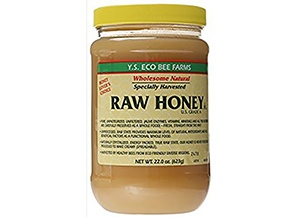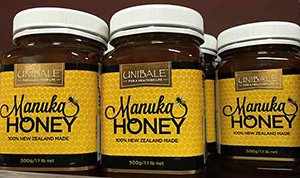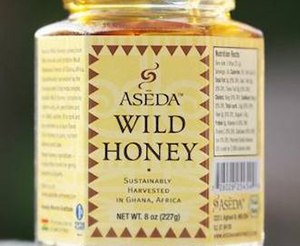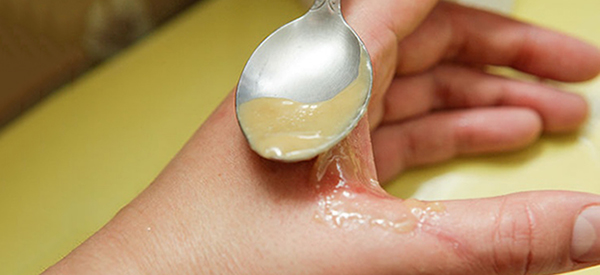Whether you enjoy the sticky amber manna that is honey or not, there are a ton of potential uses for it in survival situations, or simply to maintain your everyday health. It has been a popular remedy for centuries, and with good reason.
Types of Honey
While you may be thinking solely of the little grocery store bears, there are literally thousands of different types of honey. We’ll go over some of the varieties noted for their health benefits.
 Raw Honey:
Raw Honey:
This type of honey is lightly processed, unpasteurized, and unfiltered. It tends to be darker in color than most grocery store honey and may contain particulates of pollen and wax. You can buy raw honey from local beekeepers. Many types of honey would be classified as raw.
 Manuka Honey
Manuka Honey
This type of honey is made from the Manuka bush in New Zealand and is so noted for its healing properties that it has garnered approval in a brand name form from the FDA as topical medication for wound care. It is filtered by UV light for sterilization purposes to retain its healing properties.
 Wild Honey:
Wild Honey:
Made by bees in the Peruvian rain forests, this honey is prized the world over for its wellness purposes. Dark amber in color and much thinner than the above named honeys, wild honey is much less sweet than most other honeys.
Other Varieties:
Other common varieties of honey are based solely upon the plant pollen’s they’re made from, including clover, alfalfa, avocado, and blueberry. Wild flower honey is a catch-all term frequently used for honey of unknown origin. It comes in many forms including liquid, honeycomb, cut comb, whipped, and crystallized.
Survival and Wellness Uses for Honey
- Supplies Antioxidants – Antioxidants help reverse the damage done to your body by lifestyle or environmental conditions, and many types of honey contain high levels of them.
- Wound Healing – Honey is well-known for helping wounds heal. Manuka honey is commonly used for this purpose. Honey is perfect for this usage in a SHTF situation, simply due to the fact that it’s available in the wild and works exceptionally well.

- Soothes Sore Throats – In hot tea with lemon or all by itself, honey can help soothe a sore throat.
- Relieves Cough – Honey has been shown to be as effective as many OTC cough syrups without the nasty side effects associated with that type of medication. A spoonful may eliminate the urge to cough.
- Helps End Constipation – Honey has mild laxative properties that may help relieve mild constipation.
- Soothes Upset Stomach – Honey coats the stomach and contains nutrients and enzymes that may help eliminate nausea.
- Gut Balancing Powers – The antibacterial properties of honey may help keep bad gut bacteria in check, allowing good bacteria to prosper. One example of this balance is peptic ulcer-causing H. Pylori levels decreasing with the consumption of a couple teaspoons of honey on an empty stomach.
- Burn Care – Honey works great to both heal mild burns and keep them from getting infected. Simply apply it to the burn and cover with a bandage.
- Lessens Allergy Symptoms – Raw local honey is thought to help alleviate seasonal allergies by introducing the pollens that cause the reaction directly into the body. Think of it as exposure therapy that tastes good!
- Aids Sleep – It’s thought that a spoonful of honey provides your brain with the fuel it needs to get through the night, thus helping you get to sleep and stay that way.
- Dandruff Cure – Honey diluted 10:1 with warm water can help eliminate unsightly, itchy dandruff, studies show. It’s thought this effect is due to honey’s antibacterial, antifungal, and anti-inflammatory properties.
- Provides Energy – Honey contains lots of unprocessed sugar, which mean lots of carbohydrates. Carbs equal energy.
- Aids Digestion – It’s thought the enzymes present in honey may help you digest food more effectively.
- Weight Loss – The digestive benefits listed above are thought to help aid in weight loss. Despite the fact that honey contains lots of sugar, which is not ideal in most diets, the enzymes are said to help break up fat stored in your body for energy.
- Workout Recuperation – Honey can help your muscles and joints recover after a workout due to the nutrients and glucose it contains.
- Acne Treatment – Raw honey applied directly to acne spots may help to improve the look and feel of acne marks and decrease healing time. Used regularly in a cleanser, it can help eliminate the bacteria that cause acne.
- Blood Sugar – Honey is thought to be better at maintaining blood sugar levels than other more processed sweeteners. This may be due to honey’s unique glucose/fructose ratio.
- Moisturizing – Honey is great at moisturizing skin, which can become important in many survival situations.
- Soothes Skin Abrasions – Honey can help wounds, scrapes, and burns to feel better as well as heal better, decreasing discomfort associated with broken skin.
- Cold care – Honey can be used to soothe inflamed membranous tissues like the nasal passages when a cold is coming on.
- Wild Sweetener – Honey is, if absolutely nothing else, a sweetener that’s available nearly all over the world in the wild. Commercial sugar and other substitutes could be difficult to come by in a survival situation, but honey is always there if you know how to find, harvest, and process it.
- Parasite Elimination – A mixture of vinegar, water, and honey can help to rid the body of parasites that could be harmful.
- Contains Phytonutrients – Honey has lots of nutrients from the plants it’s made from. Nutrients support all of your body’s systems.
Storing Honey
For short-term storage, honey should be stored at room temperature in a dry, dark place like a cupboard. A secure lid is important to keep out contaminants.
Honey is actually great for long-term storage because it can be used indefinitely. The short term directions still apply, though you might consider keeping honey on the lower end of room temperature to keep it from potentially fermenting. A root cellar would be perfect for long-term storage.
If you see crystals have formed in stored honey, there’s no need to worry. Simply place the container to simmer in warm water and the crystals will dissolve. The crystals indicate that the honey has lost some of the liquid it initially contained.
You may also like:
This Bug Will Kill Most Americans During The Next Crisis (video)
Lost Remedies from Our Forefathers
How to Make the Most Powerful Natural Antibiotic
















Manuka Honey should be part of everyones prep supply. It is without a doubt the best healing product and will keep forever. Loved the article
Aseda Wild Honey is harvested in Ghana, West Africa.
Not the Peruvian jungle as your article states.
I encourage everyone to get a couple beehives. More than one is best because one hive may not produce as well as the other and you can compensate one with the other. They are a lot of fun, help your garden and flowers, and produce what this article talks about. One hive is more than enough to supply your immediate family for the whole year
I have been gardening for about fifteen years now and only had bees for last summers crop. Best production we have ever harvested and I attribute the success to the system God set up through bee pollination.
I can attest that many farmers would encourage Bee Keepers to set up their Bee Boxes at the back of their crops…….near easterly….so the bees would pollination of their crops. My great grandparents and grandmother done this in south west Indiana.
I worked the farm every summer from age 10 to 17. I was taught many things and I wish that I had paid attention much more.
Amazing to see the difference from one year to the next. Fuller plants and very few died.
Ah, honey! A delicious food that you can add to almost anything, that’s also natures healer. I always have a few kinds of honey around here. I think it’s interesting that you can tell what the bees feast on by what their honey tastes like.
Good article!
Interesting how healthy honey is!
Bee stings are also good. My grandfather the Beekeeper used to take his shirt of around the beehives to get a few good stings for arthritis, when he felt he had enough he’d put his shirt on again. Now we are learning that Bee venom is good for arthritis.
Great article, thanks for sharing! Honey is such an amazing tool in the prepping arsenal. It’s helpful in healing wounds in both humans and animals. I really couldn’t live without it, especially in a SHTF situation!
I started beekeeping last year . I had 4 hives. Over winter I lost 2. This year I connected with other beekeepers, passionate and generous people. I now have replaced the lost 2 and gained another . I have 5 now. After losing the 2, I harvested the honey. I ended up with almost 8 gsllons. I sold enough, 25 per quart, to replace my hives. But those generous keepers gave me captured swarms . Beekeepers want to help fledgling beekeepers. Generous people with great passion for our little friends.
I purchased 30 lbs of raw honey ( exact type escapes me) and have had it stored in the upper parts of my garage in Calif where it’s often warm to downright HOT. 4 yrs it’s been up there. Do you think it’s been damaged by excessive heat? I was simply told that it would last forever no matter what it endured.. Now hearing room temp preferred. Thank you, and great info ….
raw honey will keep for 1000 years if kept from mixing with water,,,,,
Yes, honey was buried with the pharaohs in the pyramids. However, I suspect because they were subterranean, the ambient temperature was probably very even all year round and probably quite cool and it would, of course, be dry inside. Ideal storage venue for any kind of foodstuffs, 50°F, and dry year round. I believe grains that were found in the pyramids was also edible even though it was a thousand or more years old. If you want you freeze dried food to last longer than 30 years, inside a pyramid is the ideal place or deep inside a dry cave.
Joelster: First: See my comments with regard to heating honey in response to another post that says not to heat it.
Secondly, storing any foodstuffs in the upper portions of your uninsulated garage is not a good idea. I would get the honey out of that area before it endures another summer. Personally, I would store the honey in a closet in the coolest room of your house.
However, I really would’t worry about the honey being damaged if I were you. But to ease your mind, open one jar look at the honey. Hold it up to the light. Does its appearance appear significantly different? Next, smell the honey. Does it smell normal? Next, wet your little finger and taste the honey. Does it taste different? If all those tests indicate no significant change in the honey, eat a teaspoonful of the honey and wait 24 hours. Do you notice any significant change in your over all health? Are you bowels normal?
Having completed all those tests, if everything appears normal, I would suggest that your honey is all right. Remember, honey is produced in many hot regions of the world where the honey sits in a hive that must be kept ventilated by the worker bees fanning the air with their wings. It can take heat. That said, however, I would get it the heck out of your garage. Come on, I live in SoCal too. The garage gets like an oven in the summertime and I live not far from the beach. If you are living inland, you can probably bake in your garage in the summertime. Very bad place to store anything that you want to eat or drink.
The word “Manuka” has been around for about 100 years or more in Tasmania, Australia. But like a lot of things, the Kiwis are trying to trademark a word and call it their own(kiwi fruit, New Zealand spinach etc). The Manuka honey in Australia has been shown to have higher healing properties in a lot of areas because of the large varieties of Leptospermum plants. Why am I having a whing about this, I hate to see trying to “own” public property and people should not pay too much for manuka honey just because it comes from New Zealand. Just check the anti bacterial grading of the manuka honey when purchasing because some are a thin blend to dilute and extend profits. Cheers.
The best way to melt the honey that has crystalized is to get a candle warmer and set the honey in a glass jar on top. It will liquify in a short time without getting to hot. I learned this from my friends in rural areas
What a cool idea! I’ve been melting honey in hot water for years. Think I even have a candle warmer
Thank you Nort!
Honey loses its antibacterial properties if heated above 62or63degreesF.
I noted a comment in article of putting in hot water/tea.
This is copied directly from the National Institute of Health’s website:
“Abstract
Honey and ghee are the two food substances used widely in our diet. In Ayurveda, it is quoted that heated honey and honey mixed with equal amount of ghee produce deleterious effects. Hence, it was of our interest to study the physicochemical characteristics and chemical constituents of heated honey and honey mixed with ghee, and their effect on daily food intake and organ weights of rats. The specific gravity of samples showed a significant decrease in honey and ghee samples heated to 140°C. The pH of honey heated to 140°C was elevated with a reduction in the specific gravity. There was a significant rise in hydroxymethyl furfuraldehyde (HMF) in 60º and 140°C heated honey samples. The browning and total antioxidant of honey mixed ghee samples was significantly higher when compared to ghee samples. Further, the authors have also evaluated the effects of consumption of heated honey, ghee, honey mixed with equal amount of ghee and heated honey mixed with heated ghee in rats. The feeding of heated honey and honey mixed with ghee for 6 weeks showed no significant change in the food intake, weight gain and relative organ weights. The study revealed that the heated honey mixed with ghee produces HMF which may cause deleterious effects.”
For reference purposes, 60°C is 140°F. 140°C is 284 degrees F. 140°C is well above the boiling point of water. I didn’t look up the boiling point of honey.
It would appear that heating honey is warm or even hot water doesn’t appear to have a deleterious effect on it.
I like this site very much, Its a real nice position to read and find information.
You made some decent points there. I did a search on the subject matter and found most
people will consent with your site.
I’ve been exploring for a bit for any high quality articles or weblog posts in this sort of space .
Exploring in Yahoo I eventually stumbled upon this site.
Reading this information So i’m glad to exhibit that
I have an incredibly just right uncanny feeling I came upon exactly what I needed.
I such a lot no doubt will make sure to do not fail to
remember this site and give it a glance on a continuing basis.
I haven’t seen anything yet
You missed one good thing about honey. When making bread, substitute 1 T honey for 1 T of the sugar, It keeps your bread from drying out so quickly and it also keeps the bread from molding so quickly.
Unfortunately, everyone knows it is incredibly difficult to refrain sometimes.
What happens is that after your skin continues to be damaged, blood rushes to the scene bringing from it chemicals, platelets and
white blood cells to help fight infection preventing the flow of blood.
Use an Exfoliating Facial Wash – Cleaning the face with water and soap isn’t enough.
Anybody know the dosage for these remedies. I like the practise of natural remedies, but I want to use enough to do the job.
A type of honey not listed above is Buckwheat honey. Very dark color, rich interesting flavor, (not something you’d want to eat out of the jar by the spoonful,) but even more effective (and much less expensive) than manuka for colds and flu. A teaspoon of Buckwheat honey in herbal tea instantly calms a sore throat for hrs and cuts the duration of a cold or flu by half and makes symptoms a lot less severe. I always keep several jars on hand for winter colds. It also has some of the highest levels of antioxidants of any honey including manuka.
I eat buckwheat out of the jar by the spoonful. It was an adjustment from wildflower honey, but it’s delicious, once your used to it.
A type of honey not listed above is Buckwheat honey. Very dark color, a rich pungent flavor, (not something you’d want to eat out of the jar by the spoonful,) but even more effective (and much less expensive) than manuka for colds and flu. A teaspoon of Buckwheat honey in herbal tea instantly calms a sore throat for hrs and cuts the duration of a cold or flu by half and makes symptoms a lot less severe. I always keep several jars on hand for winter colds. It also has some of the highest levels of antioxidants of any honey including manuka.